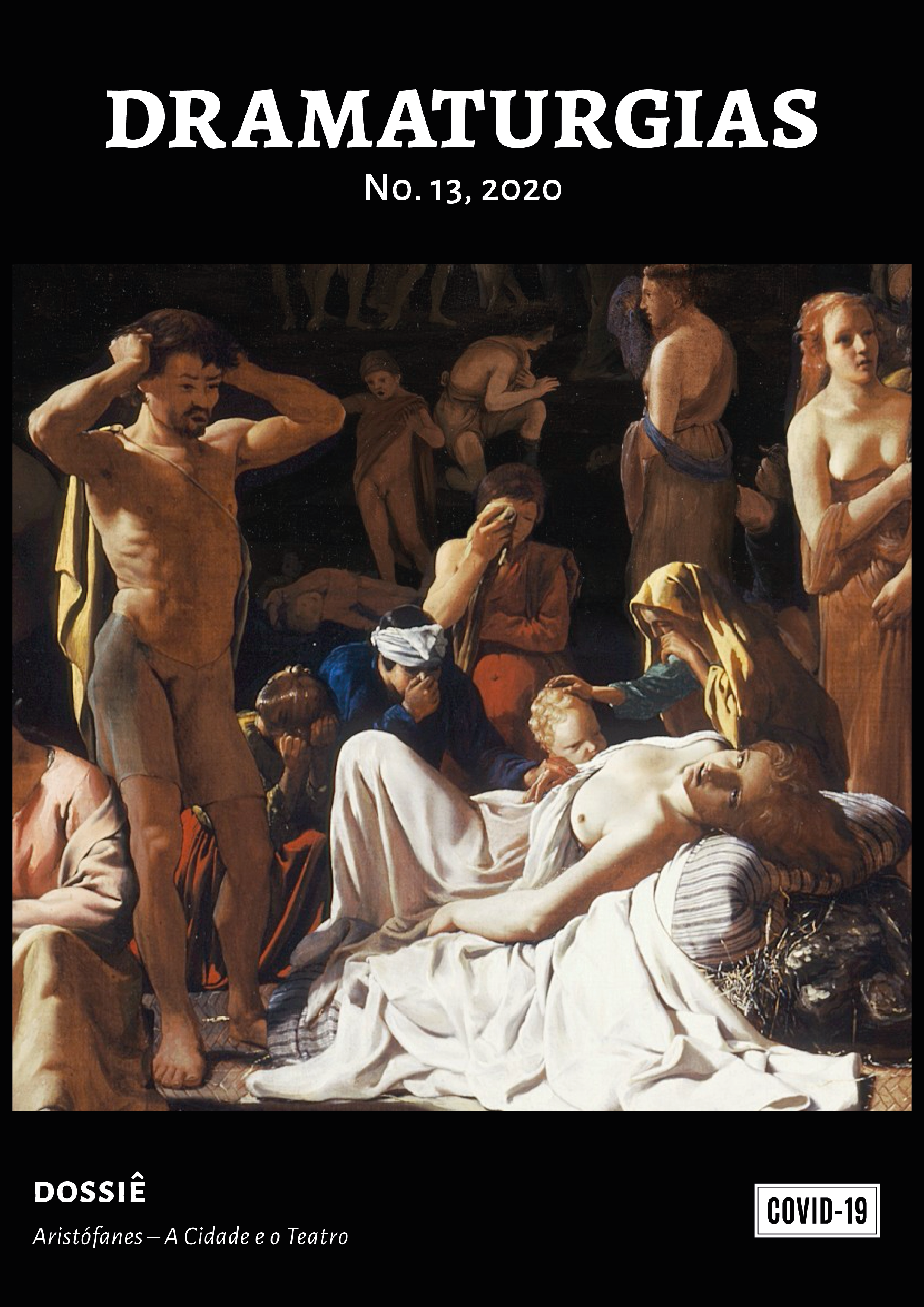The City and the Theater in Knights of Aristophanes: The Poet and the Politician ”“ Introduction to Knights Translation
DOI:
https://doi.org/10.26512/dramaturgias.vi13.31065Keywords:
Knights. Aristophanes. Poet. Politician.Abstract
The play Cavaleiros, by Aristophanes, dates from 424 B.C. and is the most political comedy among those that remain of the playwright, therefore it is also the most political of ancient Greek comedy. The play's plot is a dispute, or agon, between a slave (the Barraqueiro, who represents the demagogue Cléon), recently bought by the People, personified as the boss, and a sausage seller (the Vendetripa, which we suggest representing the comic Poet), by the leadership of Athens. The rivalry and antagonism between Vendetripa and Barraqueiro hide identity and duplication of each other. The People of Athens is the prey disputed by both, who use impudence and malice to get the government of the polis. But in the end, Vendetripa proves to be a true friend of the People, while Barraqueiro only pretends to have a love for the People, to get rich. We translate the names of the characters emphasizing their characteristics as market vendors: Vendetripa, Barraqueiro, Bom de Feira, Zeus Feirante.
Downloads
References
ARISTÓFANES. Os cavaleiros. Introdução, versão do grego e notas de Maria de Fátima de Sousa e Silva. Coimbra: Instituto Nacional de Investigação Científica, 1985.
ARISTÓFANES. Cavaleiros. Tradução de Ana Maria César Pompeu e Grupo de Estudos Aristofá‚nicos -GEA. Edição Bilíngue. Fortaleza: Substá‚nsia, 2017. ARISTOPHANES. Aristophanes Comoediae, ed. F.W. Hall and W.M. Geldart, vol.
1. F.W. Hall and W.M. Geldart. Oxford. Clarendon Press, Oxford. 1907. BELTRAMETTI, Anna. “Le couple comique. Des origines mythiques aux dé-
rives philosophiques”. In: Desclos, Marie-Laurence (dir.) Le rire des grecs: anthropologie du rire en Gré€ce ancienne. Grenoble: Editions JéroÌ‚me Millon, 2000, p. 215-226.
DESFRAY, Suzanne. “Oracles et animaux dans les Cavaliers d”ŸAristophane”. L’Antiquité Classique, 35-56, 1999.
HESÍODO. Teogonia: a origem dos deuses. Estudo e tradução Jaa Torrano. São Paulo: Iluminuras, 2001.
NIGHTINGALE, Andrea Wilson. Genres in Dialogue: Plato and the construct of philosophy. Cambridge University Press, 1995.
POMPEU, Ana Maria César. Aristófanes e Platão: A justiça na pólis. São Paulo: Biblioteca 24 Horas, 2011.
______Dioniso matuto: Uma abordagem antropológica do coÌ‚mico na tradução de Acarnenses para o cearensês. Curitiba: Editora Appris, 2014.
PLATÃO. A república. Introdução, tradução e notas de Maria Helena da Rocha Pareira. 7a. ed. Lisboa: Fundação Calouste Gulbenkian, 1993.
________. Diálogos: Fedro, Cartas, O primeiro Alcibíades. Tradução Carlos Alberto Nunes. V. 5. Universidade Federal do Pará, 1975.
________. Górgias. Introdução, tradução do grego e notas de Manuel de Oliveira Pulquério. Lisboa: Edições 70, 1991.
PLUTARCH. Moralia. with an English Translation by. Harold North Fowler. Cambridge, MA. Harvard University Press. London. William Heinemann Ltd. 1936. 10.
SAETTA-COTTONE, Rossella. “Aristophane: injure et comique”, Methodos [En ligne], 1 | 2001, mis en ligne le 02 avril 2001, consulté le 05 février 2015. url: http://methodos.revues.org/143; DOI : 10.4000/methodos.143
SMITH,NicholasD.“DivinersanddivinationinAristophaniccomedy”.Classical Antiquity, 140-158, 1989.
VAN DAELE, Hilaire. Notice ”“ Les Cavaliers. In: ARISTOPHANE. Les Acharniens, Les Cavaliers, Les Nuées. Texte établi par Victor Coulon et traduit par Hilaire Van Daele. Paris: Sociéte D’Édition “Les Belles Lettres, 1952.
WHITMAN, Cedric H. Aristophanes and the comic hero. Cambridge ”“ Massachusetts: Havard University Press, 1964.
Downloads
Published
How to Cite
Issue
Section
License
Autores mantém os direitos autorais e concedem à revista o direito de primeira publicação, com o trabalho simultaneamente licenciado sob a Licença Creative Commons Attribution que permite o compartilhamento do trabalho com reconhecimento da autoria e publicação inicial nesta revista.



